Martin Luther

Martin Luther
2017
The Reformation’s 500th Anniversary!
Celebrating the Church’s Return to the Word of God
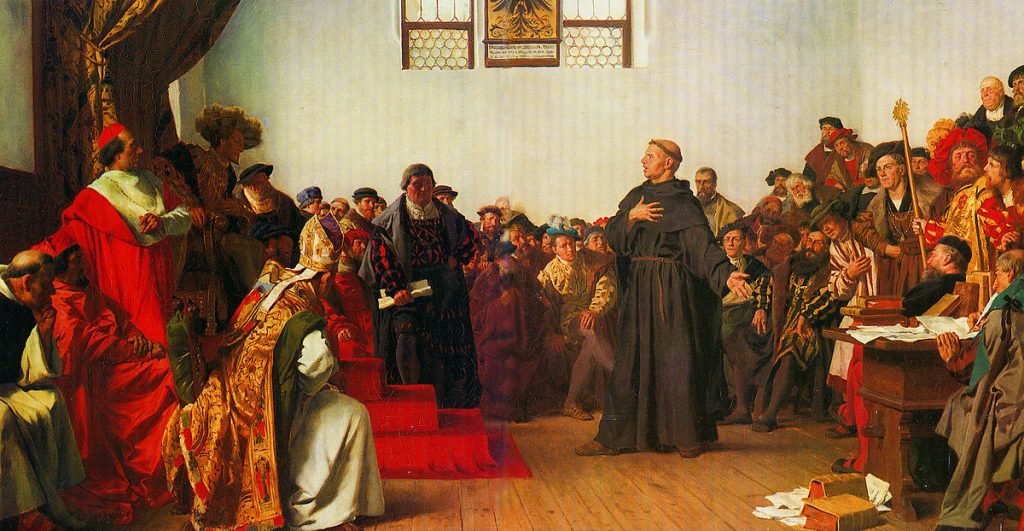
“Unless I am convinced by Scripture and plain reason I do not accept the authority of popes and councils, for they have contradicted each other – my conscience is captive to the Word of God. I cannot and will not recant, for to go against conscience is neither right nor safe. Here I stand, I can do nothing else. God Help me. Amen. ”
Martin Luther
There is no more important spiritual question than how we’re saved and who we’re saved by.
The Bible is clear – we’re saved by God’s grace alone, through faith alone, in Jesus Christ alone. (Ephesians 2: 8-9)
The man of God who reclaimed this central truth of the Bible was Martin Luther.

October 31, 1517, the day Luther nailed his 95 Theses to a church door in Wittenberg, Germany is remembered as the beginning of the Reformation of the Christian Church.
Luther was criticizing the Catholic church’s practice of selling indulgences, letters signed by the pope that guaranteed forgiveness of sins if money was paid to the church, the more paid, the more forgiveness granted.
Luther would also object to the sale of masses for the dead to supposedly earn forgiveness for them as well, and Rome’s practice of urging Christians to pay to see the relics of saints.
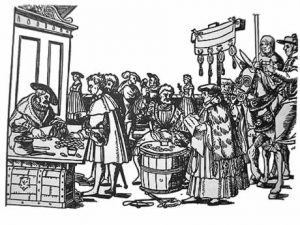 Forgiveness for sale: papal representatives hawking ‘indulgences.’
Forgiveness for sale: papal representatives hawking ‘indulgences.’
All these practices run counter to the key Biblical truth Luther would come to proclaim: salvation by God’s grace alone for the sake of faith in Jesus Christ.
Today we have the wonderful legacy of the Lutheran Reformation that gave Christians back the truth, power, and love in the Gospel message.
Five hundred years ago the Roman Catholic church taught in error that people must, at least in part, earn their own salvation. This un-Biblical teaching continues today.
Martin Luther was born in 1483, in Eisleben, Germany. It was then part of the ‘Holy Roman Empire.’
In 1505 Luther received a Master of Arts degree from the University of Erfurt and at his father’s urging entered Law School.
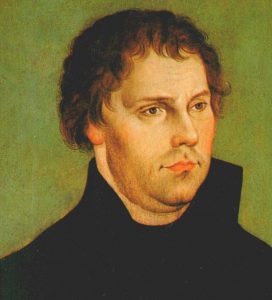
“That is what Reason can neither grasp nor endure and what has offended all these men of outstanding talent who have been so received for so many centuries. Here they demand that God should act according to human justice, and do what seems right to them or else cease to be God.”
Luther
Drawn to philosophy Luther found it unsatisfying as it taught about the use of reason but offered no insight into God or salvation, which for Luther was more important. The reason could not lead men to God.
For Luther, human reason could be used to question people and their institutions, but not the Almighty. We can only learn about God through divine revelation, Luther believed, and so Holy Scripture became increasingly important to him.
In July 1505 Luther experienced a life-changing event. Caught in a severe thunderstorm with lightning striking around him, Luther cried out to God and promised that if he were spared he would become a monk.
Martin kept his promise and on July 17, 1505, entered an Augustinian cloister.
Luther devoted himself to monastic life with its fasting, long hours in prayer, pilgrimages, and frequent confession.

“We do not become righteous by doing righteous deeds but, having been made righteous, we do righteous deeds.” Luther
Martin recalled this period of his life as one of deep spiritual despair. He wrote, “I lost touch with Christ the Saviour and Comforter, and made of him the jailer and hangman of my poor soul.”
This was because the Roman church taught then, and now, that salvation depends upon our good works, our effort.
In 1507, Luther was ordained a priest.
At age 27, he was given the opportunity to be a delegate to a church conference in Rome. He came away more disillusioned, and deeply discouraged by the immorality and corruption he witnessed there among Catholic clergy. Upon returning to Germany, Luther enrolled in the University of Wittenberg, excelled in his studies and received a doctorate, becoming a Professor and Chair of Theology.
He held the position for the rest of his life.
Luther was made provincial vicar of Saxony and Thuringia by his religious order in 1515. As such he visited and oversaw eleven monasteries.
It was in his study of the Bible in the original languages in which it was written that Luther came to understand the true message of Holy Scripture and how we are saved.
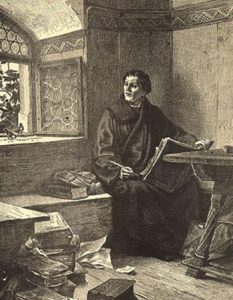
In 1515, while preparing a lecture on Paul’s Epistle to the Romans, Luther read, “The just will live by faith.” He dwelled on this statement for some time. Finally, Luther realized the key to spiritual salvation was not found in making ourselves righteous but in believing that faith alone brings salvation.
Luther found this message was repeated throughout the New and Old Testaments and that this is the true meaning of Christianity — that we are justified, or made right with God, by faith in Christ, not by the works of the Law. This correct understanding of God’s Word set in motion the Reformation.
Luther now understood that in the Book of Romans and other letters the Apostle Paul was speaking of a righteousness that God in His grace was making available to those who would receive it passively, not those who would achieve it actively, but that would receive righteousness by faith, and that this was the only way a person could be reconciled to a holy and righteous God.
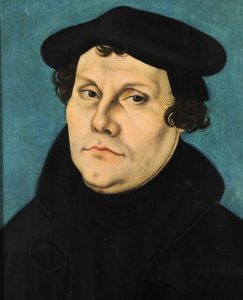
Portrait of Luther by Cranach the Elder
Understanding the New Testament in the original Greek was critical here. The Catholic church had been using the Vulgate, a Latin translation of the Bible.
The Latin word for justification used then in church history was justificare, it’s the word from which we get the English word justification, and it came from the Roman judicial system.
The term justificare is made up of the word Justus, which is justice or righteousness, and the verb, the infinitive facare, which means to make. Accordingly, the Latin fathers understood that justification is what happens when God through the sacraments of the church, and individuals through their good works, makes unrighteous people righteous.
Luther, however, was now looking at the actual Greek word in the New Testament, not the Latin. The word dikaios, dikaiosune, which didn’t mean to make righteous, but rather to regard as righteous, to count as righteous, to declare as righteous.
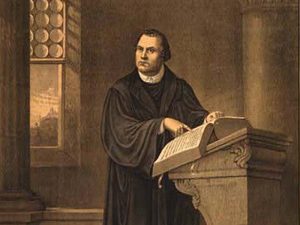
“Faith alone makes someone just and fulfills the law.”
Luther
This was the moment of awakening for Luther. He wrote, “Here Paul is not talking about the righteousness by which God Himself is righteous, but a righteousness that God gives freely by His grace to people who don’t have the ighteousness of their own.”
The Bible was saying the righteousness by which we will be saved is not ours but Christ’s. It’s what he called a justitia alienum, an alien righteousness; a righteousness that belongs properly to someone else – namely Jesus. Luther wrote, “When I discovered that, I was born again of the Holy Spirit. And the doors of paradise swung open, and I walked through.”
Luther now understood justification as being entirely the work of God. Against the teaching of his day, that believers are made righteous through the ‘infusion’ of Gods grace into the soul, Luther, based on the Bible, asserted that Christians receive righteousness entirely from outside themselves; that righteousness not only comes from Christ, it actually is the righteousness of Christ, and remains outside of us but is merely imputed to believers — that is, treated as if it were theirs through faith.
“That is why faith alone makes someone just and fulfills the law,” said Luther. “Faith is that which brings the Holy Spirit through the merits of Christ.” Thus faith, for Luther, is a gift from God, and “. . .a living, bold trust in God’s grace, so certain of God’s favour that it would risk death a thousand times trusting in it.”
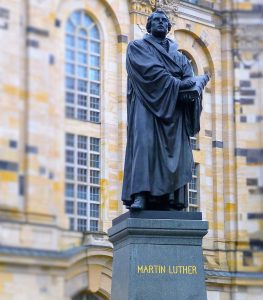
Many portraits and statues of Luther show him holding the Bible while preaching. Recognizing the Bible as the sole authority in church life and translating it into the language of the people were some of the first Lutheran reforms.
Luther’s study and research led him to question the contemporary usage of terms such as penance and righteousness in the Roman Catholic Church. He became convinced that the church had lost sight of what he saw as several of the central truths of Christianity — the most important being the doctrine of justification by faith alone.
As a result of his lectures on the Psalms and Paul‘s letter to the Romans, from 1513–1516, Luther “achieved an exegetical breakthrough, an insight into the all-encompassing grace of God and all-sufficient merit of Christ.”
Luther wrote that the “righteousness of God” was not God’s active, harsh, punishing wrath demanding that a person keep God’s law perfectly in order to be saved, but rather that God’s righteousness is something God gives to a person as a gift, freely, through Christ.
Luther emerged from his tremendous struggle with a firmer trust in God and love for Him. The doctrine of salvation by God’s grace alone, received as a gift through faith and without dependence on human merit, was the measure by which he judged the religious practices and official teachings of the Catholic church and found them un-Biblical.
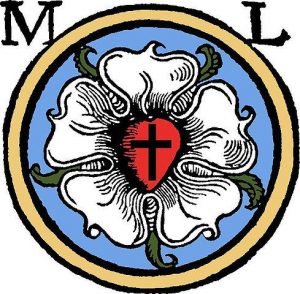
Luther explained justification this way in his Smalcald Articles:
“The first and chief article is this: Jesus Christ, our God and Lord, died for our sins and was raised again for our justification (Romans 3:24-25). He alone is the Lamb of God who takes away the sins of the world (John 1:29), and God has laid on Him the iniquity of us all (Isaiah53:6). All have sinned and are justified freely, without their own works and merits, by His grace, through the redemption that is in Christ Jesus, in His blood (Romans 3:23-25). This is necessary to believe. This cannot be otherwise acquired or grasped by any work, law, or merit. Therefore, it is clear and certain that this faith alone justifies us…Nothing of this article can be yielded or surrendered, even though heaven and earth and everything else falls (Mark 13:31).”
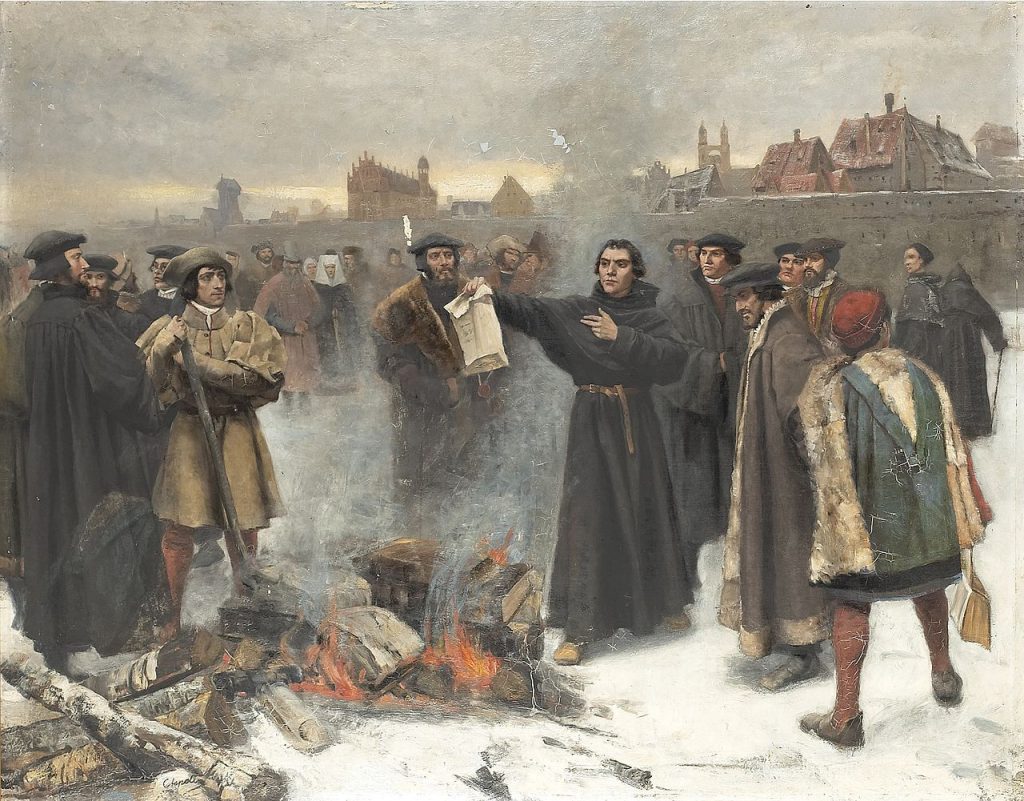
Martin Luther with other Reformers burning the papal bull of excommunication
For his efforts to recover Biblical truths in 1520, hardly three years after his original protest, Luther was excommunicated by Pope Leo X. After Luther’s courageous stand before Emperor Charles V on April 17, 1521, at the Diet of Worms he was, until his death in 1546, an outlaw in imperial Catholic Europe. By this time Luther had set out in many writings his ideas of reform that were being circulated throughout Europe and beyond.
Luther would go on to translate the Bible into the language of the people so Christians could read it for themselves. He also put in place Christian reforms that changed the Church and the world to this day.
Luther developed a liturgy that was also in the language of the common person, not Latin; introduced congregational singing of hymns; and the participation of the laity in the Lord’s Supper in receiving both the wine and bread since this sacrament and its blessings were for all Christians — not just for one privileged group.

Preaching that emphasizes the centrality of Christ and salvation by God’s grace through faith in Jesus is a hallmark of Lutheran Biblical worship
Lutheran reforms to Church liturgy meant the laity could now hear the Word of God in their own language, not Latin, and receive both the bread and wine of the Lord’s Supper as Christ commanded.
Luther also made Christian education and Bible study available to all Christians, not just Church officials. Universal education that included the education of the poor and women, as well as men, were Lutheran reforms as all needed to read and understand the Bible. The separation of church and state also stems from the Lutheran Reformation.
Unlike the Anabaptists, Luther did not call for the overthrow of the government and unlike Calvin, Knox, and Zwingli, Luther did not include in his reforms a formula for the perfect civil society. For Luther the Bible was not a blueprint for creating a utopian world, but the vehicle in which God’s message of justification, of salvation through Christ alone, was preserved for all time.
The Reformation brought about wars launched against the Lutheran lands by the Holy Roman Empire and called for by the Catholic church. These wars resulted in what modern historians estimate to be eight million casualties.
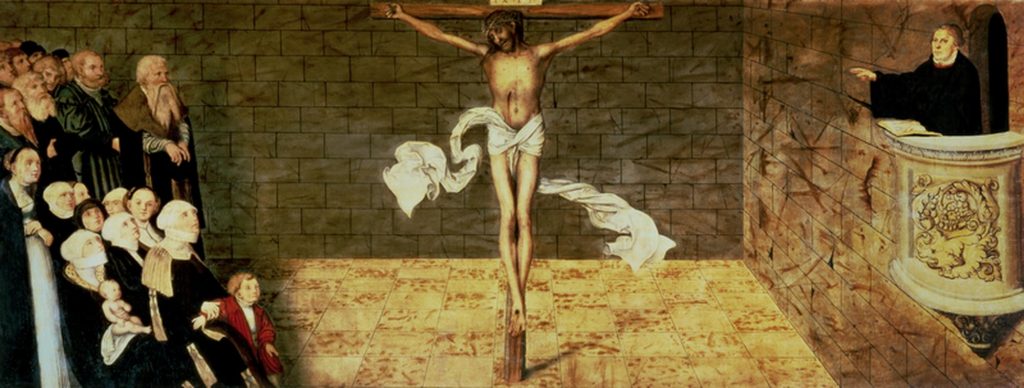
The Reformation survived, however, and the gift of God’s Word, correctly preached and taught was preserved, so that today we can lay hold of the promise of salvation through God’s grace alone, through faith alone, in our Lord and Saviour Jesus Christ alone.
